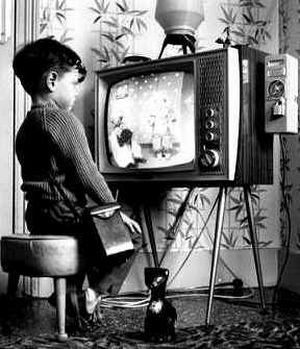Television and Children: Health Concerns
An article from Time magazine claims that watching television is sedentary behavior, which leads to obesity and bad health. The author of the article, Alice Park, says that researchers in the U.S. and in Spain studied 111 children 3-8 years old and concluded that of all the kinds of inactivity they studied, tv-watching was worst. The study showed a higher blood pressure in kids who watched a lot of tv, whether the kid was overweight or healthy. Other activities such as computer usage did not show the same blood pressure issues. The researchers tracked the childrens’ inactivity over one week using accelerometers. They found that kids who watched 90 – 330 minutes of tv per day had systolic and diastolic blood-pressure readings that were much higher than children who watched less than half an hour per day. The author quotes Dr. David Ludwig of Children’s Hospital Boston, who says, “These results show that TV-viewing really is the worst of all possible sedentary activities”. She also cites the American Academy of Pedriatrics, which recommends that children under 2 should not watch tv at all and that older children should watch only 1 or 2 hours a day. The researchers also explain that tv-watching is often accompanied by eating ‘junk food’, which can also raise blood pressure readings.
The author, Alice Park, is a staff writer for Time magazine. She generally reports on health and medicine issues. Perhaps as a result of her background, the article seems much more focused on the medical/health effects of watching too much tv rather than the psychological effects. This differs from most of the readings, which have been more focused on psychological impacts.
According to Lynn Spiegel, adults attacked television for several reasons. One reason is that graphic violence, sexuality, and bad behavior have unwholesome effects on children which threaten “the need to maintain power hierarchies between generations and to keep children innocent of adult secrets” (144). Parents also worried that tv did not promote family values, and felt a lack of control over what the children were exposed to (147). Adults had “a marked desire to keep childhood as a period distinct from adulthood”, so they were extremely concerned about children aquiring knowledge of adulthood before they should (150). And, of course there were fears of children imitating on-screen violence and becoming juvenile delinquents (146). However, there is some overlap between these two sources. Spiegel mentions the idea of “telebugeye”, or “a pale, weak, stupid-looking creature who grew bugeyed from sitting and watching telvision too long” (147). Parents were convinced that telvision was becoming an addiction for children, which would “reverse good habits of hygiene, nurtrition, and decorum, causing physical, mental, and social disorders” (147). I think the Time article reveals something new about the adverse effects of television, (the blood pressure findings) although the topic of health concerns as a result of watching tv is not new. These worries voiced in the Spiegel reading and the Time article have been constant since the 50’s.

